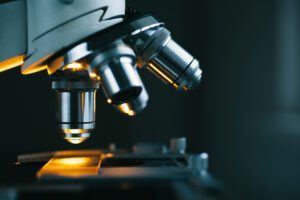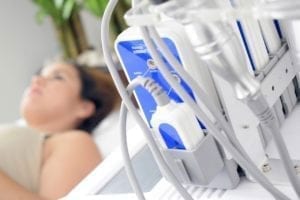BRCA-Mutated Breast Cancer
What is BRCA-mutated breast cancer?
BRCA1 and BRCA 2 are the most well-known tumor suppressor genes that are linked to breast cancer and ovarian cancer risk. (BRCA is an abbreviation for BReast CAncer.) Although everyone has these genes, some people have rare mutations that prevent a BRCA gene from effectively repairing broken DNA to guard against breast cancer. Thus, BRCA-mutated breast cancer is a type of cancer that develops as a direct result from these abnormal gene mutations. These mutations are rare, and they can affect the risk of cancers in both men and women.
Women with the harmful BRCA mutation have about five times the normal risk for developing breast cancer. BRCA mutations can increase the risk of other cancers, most commonly ovarian cancer, but also colon, pancreatic, and prostate cancer. These cancers tend to appear at an earlier age than other forms, though they are not more aggressive.
BRCA1 breast cancer is associated with triple-negative breast cancer, and BRCA2 is associated with post-menopausal breast cancer (even though there is still a significant risk of pre-menopausal breast cancer, as well).
What are the symptoms of BRCA-mutated breast cancer?
Initially, these breast cancers may not cause any symptoms, and abnormalities in the breasts may not be noticeable. However, according to the American Cancer Society, any of the following could be a symptom of breast cancer:
- Swelling in all or part of the breasts
- Skin irritation or dimpling
- Pain in the breast or nipple
- Redness, scaliness, or thickening of the breast or nipple skin
- Nipple discharge
- Lumps in/around the breasts
What causes BRCA-mutated breast cancer?
The cancer risk caused by BRCA mutations are inherited in a dominant fashion from either parent. Therefore, the cancer that develops is hereditary and caused by the abnormal gene mutation.
How is BRCA-mutated breast cancer diagnosed?
Intensive cancer screenings should be done in women who have the BRCA mutation, in order to detect the cancer as quickly as possible. Breast MRIs can also be done once a year, as well as mammograms, CT scans, and ultrasounds. If an area looks suspicious, a biopsy is usually done to confirm a diagnosis.
Genetic testing can be done to test for the BRCA mutation if someone suspects that there is a higher-than-normal prevalence of cancers in his/her family.
What are the treatments for BRCA-mutated breast cancer?
The treatments for BRCA-mutated breast cancer are similar to general breast cancer treatments. These are focused on removing the cancer in the breast, whether by lumpectomies, radiation therapy, or even a bilateral mastectomy because if someone has a breast cancer diagnosis, he/she is at an increased risk for developing a second type of breast cancer.
In addition, systemic therapies may be used to reach the cancer cells in the body. These therapies include chemotherapy, targeted therapy, and hormonal therapy. BRCA2 breast cancer can benefit from hormonal therapy treatments, though this unfortunately does not seem to help in BRCA1 breast cancer.
Where can I find out more about BRCA-mutated breast cancer?
BRCA-mutated Breast Cancer Articles

IDEAYA’s IDE161 Receives Fast Track Designation for HR+ Her2- Breast Cancer

New Podcast Episode: Jasmine Souers, Missing Pink Breast Cancer Alliance

Antonio Cancer Team Finds New Approach for Triple Negative Breast Cancer

Study of the Week: Statins Could be Useful in Triple Negative Breast Cancer

LYNPARZA Trial for BRCA-Mutated HER2-Negative Breast Cancer Achieved iDFS Superiority Boundary

A Courageous Decision: The Valdez Twins Decided to Stop Cancer Before It Started








